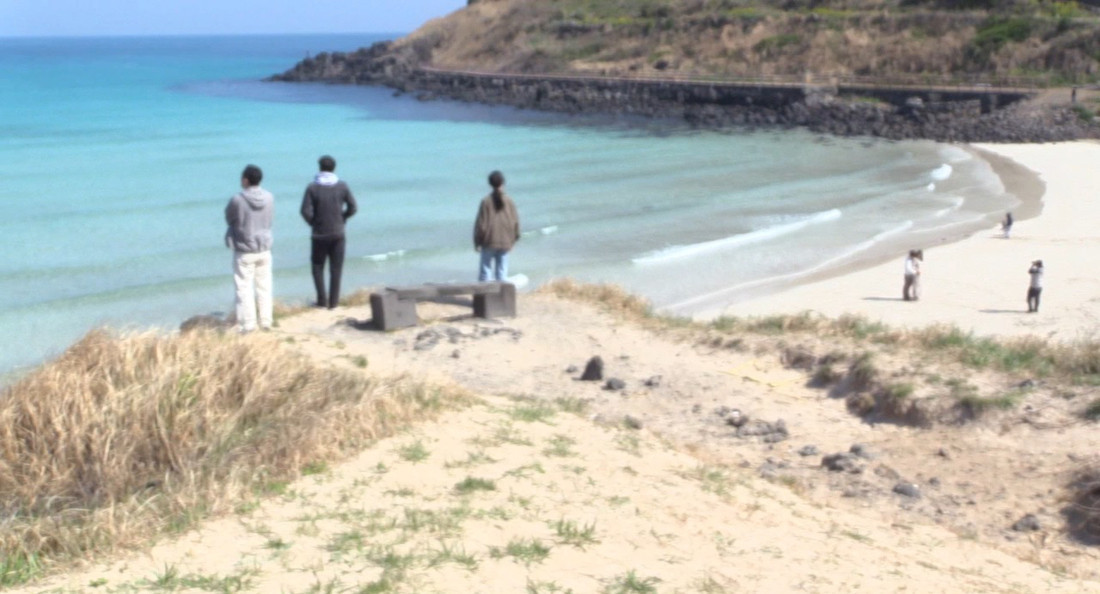Critipeg: In Water
★★★☆☆
Lights, camera, inaction! From Korean workhorse filmmaker Hong Sang-soo comes In Water, a modest tale of loneliness and having no idea what to do with a film budget.
Sang-soo, who has produced a whopping 30 films over 27 years, is equal parts auteur and autocrat. Here, he functions as director, writer, producer, composer, editor and cinematographer. Watching In Water, it’s evident, but nonetheless impressive, that he pulls it off.
But first, a brief diversion. In light of In Water’s 62-minute runtime, the Dave Barber Cinematheque has offered the FIRE+WATER double billing, pairing it with the eccentric film-festival debut The Daughters of Fire. It’s an inspired choice: an apocalyptic mini-opera where three victims of a volcano eruption in Cape Verde create an angelic chorus of lament amidst a Dante-esque hellscape. It’s a rousing tale of family and brimstone.
Now back to the main feature. Stop me if you’ve heard this before: a director, a cinematographer and an actress not altogether familiar with each other spend a week on Korea’s Jeju Island. The idea is, with $3,000 and a week to shoot, diffident Seoung-mo (Shin Seok-ho) will be struck with vision and a great idea. This is all in the pursuit of cinematic “honour” rather than financial gain.
In Water could be considered a social drama. As the trio spend time together, Seoung-mo’s shyness and flighty artistic temperament alienate him from his childhood friend Nam-hee (Kim Seung-yun) and more effortlessly convivial co-collaborator Sang-guk (Ha Seong-guk), their cinematographer. Seoung-mo is desperately lonely, and his longing for connection entwines with his pursuit of aesthetic glory until they’re nearly indistinguishable.
For some, the minimalism will grate. The hour-long production is in no rush, as characters eat pizza for four minutes in relative silence, aimlessly wander alleys looking for scenery and light up cigarettes to kill time.
Nearly the entire film is shot out of focus. Is that a blithe acknowledgement of the film’s and the protagonist’s lack of direction, or the idiosyncrasy of an industry veteran? It doesn’t really matter, because it works.
Because dialogue is sparse and facial expressions are imperceptible, body language is used to great effect here. The trepidation to, say, sit down on a bench while the others gaze thoughtfully into the distance, searching for inspiration on the horizon, subtly reveals attitudes towards one another and their film project.
Unceremonious scene cuts and a two-track score can betray the picture as disaffected, but Hong ingratiates himself with a simple tale of immense emotional intelligence. It seems that In Water’s aim is neither honour nor money. The ambiguity makes it a purer cinematic experience.
Seoung-mo earns his first victory in production after an oddly tense night of drinking. A prior encounter with a bystander is recreated for the film, only with a cameraman in view. We get the sense Hong is having a good-natured laugh at the audience.
The themes of the film are awkwardly articulated via song lyrics as Seoung-mo manifests his solitude by walking into the ocean for a scene in his film. He wades further out in the water, and his out-of-focus blob is absorbed by the crashing waters, recreating the In Water poster. Hong has made good on the film’s titular promise. What more do you want?
Published in Volume 78, Number 15 of The Uniter (January 25, 2024)







